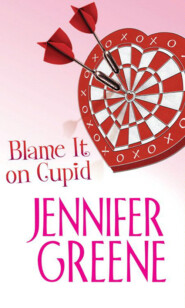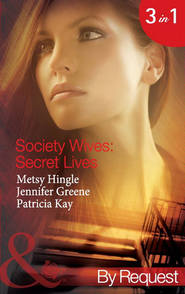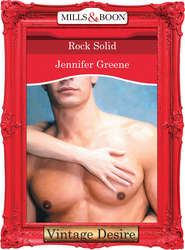По всем вопросам обращайтесь на: info@litportal.ru
(©) 2003-2025.
✖
Blame It on Chocolate
Автор
Год написания книги
2018
Настройки чтения
Размер шрифта
Высота строк
Поля
“You are.”
She redraped the cloth in a lot more modest fashion, mentally damning Nick from here to Poughkeepsie for bullying her into this waste-of-time doctor visit. “You don’t understand. This has to be an ulcer. I have a great job. A job I absolutely love. But a few weeks ago, things changed—the job’s even more wonderful, really, but it also become much more serious and stressful. And I’m a type A, you know? A worrier. A perfectionist. Anybody who knows me would tell you that I’m prime ulcer material—”
“You might find this hard to believe, but I’m usually the one to make a diagnosis, not the patient, since I happen to be the doctor,” Dr. Jargowski said with wry humor, and gave a subtle nod to the nurse, indicating she could leave the room now that the pelvic, private part of the examination was over.
Lucy didn’t care whether the nurse was there or not. “Well, the blood tests and exam have to be wrong. Maybe I have weird insides, did you think of that? Maybe I have a hernia or something making me nauseous. Maybe I have, I don’t know, fibroid tumors in my stomach—”
“Try to trust me a little, would you? ‘Weird insides’ is not a medically descriptive term. And you’d be making medical history if you showed up with fibroid tumors in your stomach, since that’s an impossibility. The symptoms, in fact, are not emanating from your stomach at all.”
“Look, would you listen to me? I don’t have a guy! I haven’t seriously dated anyone in almost two years! And of course I go out. But I don’t casually—” She waved her hand expressively.
“Ah. Well, even if you don’t normally…” He waved his hand in the same expressive gesture “…it definitely appears that you must have. At least once. Around seven weeks ago.”
Men. Men, men, men. Outside, Lucy found that the late afternoon had deteriorated into a drizzling, drooling rain—which was going to melt all the snow and make everything icy. That was probably a man’s fault, too.
She dove into her car, locked the doors, started the heater and defroster on high and then sat there, freezing to death while she waited for it all to work. Eventually she thawed enough to move—or at least to lean over far enough to click open the glove compartment.
She used to keep pepper spray in there, but over the years she’d come to define “emergency supplies” a little differently. Thankfully she didn’t waste time storing plain old candy bars for the serious crises, because now, she could go straight for the truffles. After downing three of Bernard’s best, the steam had cleared from the windshield and her body was no longer stiff as an icicle.
Now she was just completely hysterical.
She drove home snuffling and blubbering and talking to herself. There was no one she could tell. No one she could face. Hell’s bells, looking at the woman in the mirror shamed her. Twenty-eight-year-old responsible women just didn’t make mistakes like this. And Lucy was more than responsible. She was ultra-responsible.
In the privacy of the car, she had to admit there was a slim, very slim, possibility that the doctor wasn’t a quack.
It was even vaguely, remotely possible that the Night of The Chocolate could have involved some completely unplanned, unexpected, impossible-to-prepare-for—impossible-to-imagine—behavior on her part.
It was about the Bliss, she thought morosely. Bliss just wasn’t regular chocolate. And the night she’d tested the new Bliss, she’d discovered right away that there was something chemically…extra…in the new beans. Something powerful. Something dangerous. That had to be it. What else could explain something that could change a sensible, practical, basically shy woman into a raving nymphomaniac?
Oh, God. She’d buried the memory so deep she was positive it’d never find its way to the surface again.
She moaned several times during the drive—every time that memory edged closer to her consciousness. On the inside, she felt like an eggshell with spider cracks, cracks that were slowly seeping over the whole surface of the shell. Her whole life was about to explode in a big, messy phlat. There was no way it’d ever go back together the same way.
Please God. Let this be a mistake. Let me have an ulcer. Let me have a tumor. Let me have anything but a pregnancy. Come on. You know this isn’t fair. Nobody should have to pay for the one single thing they did wrong, should they? Can’t you find some really good sinners to vent on?
Her car swerved and she had to give up the sniveling. The temperature was dropping, turning the roads to black glass. By the time she reached home, she’d leveled the glove compartment’s supply of emergency truffles and her chin had locked in a grim line. Her hands were stiff from controlling the wheel so hard. Whether her life was a disaster or not, she just wanted to get inside her house and put up her feet for a while. She was whipped.
She’d almost forgotten her dad was installed at her place until she pushed open the door and found all the lights on. “Dad?” The TV blared from the living room. It sounded like sports in a foreign language-although truth to tell, most sports sounded like a foreign language to her. Her fresh-painted white boxes in front of her green couch—the boxes that functioned as a coffee table, she thought—were littered with magazines, three dirty glasses, a bowl of aging cereal and a spill of loose pocket change.
“Da—?”
“Oh, there you are.” Her dad strolled in from the kitchen, his hair unbrushed and sticking straight up, his feet bare. He’d been top of his class at Harvard Medical School, had students trail him down the hall whenever he spoke, had an international reputation as a heart surgeon. And he’d turned into a waif. “I was getting really worried. And really hungry.”
“Hungry—”
“I don’t care what you make, honey. You know I’m not fussy. I don’t want to be any trouble. Don’t you usually get home from work sooner than this, though? I’ve had a terrible day. Terrible…”
“Oh, Dad.” She pushed off her jacket and reached out her arms. Luther made an attempt to fold into them. “Have you talked to Mom?” At the look in his eyes—holy kamoly, for an instant there, he looked as if he were going to cry, so she hastily changed the subject. “I don’t always cook during the week, so I’m not sure what’s around. But we’ll look, okay?”
“Everything’s such a mess….”
She noticed that. Oh God, oh God. The kitchen in her duplex was hardly state-of-the-art, but it was still hers. There was no one to tease her for keeping the counters spotless and the sink smelling like fresh Soft Scrub, and she’d slowly been collecting Staub. It cost more than she could afford, she admitted it—and suffered lots of guilt for indulging herself—but she’d only been buying a piece at a time. Which meant she had three. Her dad must have tried to heat something for lunch in the red Staub terrine. The remnants looked like baked cheese. All-day-baked cheese. Well-well-well-well baked cheese.
“My nurse cancelled my surgical schedule for another week, but eventually I have to go back to work. Obviously. It’s just…I don’t know where to go. How to function. I can’t commute from here, but I can’t go home….”
“Okay, okay…” She squirted soap in the sink, started the water running, patted her dad, ran back out in the cold to fetch the mail, started a pot of tea, opened the fridge. “I could do some fresh pasta with chives and mozzarella and mushrooms—”
“How about burgers?” Her dad sank in a kitchen chair. “What if I can never work again?”
Lucy pawed through the freezer again. “Or we could have some veggie lasagna. With a fresh salad—”
“How about pork chops? With your mother’s mint sauce. Unless that’s too much trouble.” Her dad covered both his eyes. “I never cheated on her, you know. She’s the only woman I ever loved. I adore her, Lucy. I don’t know what I did that was so wrong.”
“All right, all right. We’ll have burgers.”
“She said…she didn’t love me anymore.”
“Oh, Dad—”
“She said I couldn’t find my own shoes. That I needed a keeper, but she wanted to be a wife, not a keeper. She said I couldn’t find my own shoes, my own wallet. She said I couldn’t find my own life. Lucy?”
“What?”
“She was right. I can’t. What am I going to do?”
She gave him some lettuce to shred. Then some more tea. Then started working with some ground round—in the long run, she refused to stuff her dad with the cholesterol-packed diet he wanted, but tonight just wasn’t the right time to argue with him.
She just didn’t seem to have a choice about putting her own crisis on a far back burner. She cooked. Picked up. Cleaned. Listened to her dad. Tried to fit in a general plan for Project Bliss to give to Nick in between it all, but of course, the phone kept ringing.
Right before nine, someone rapped on the back door. She found Russell hunched on the porch. At nineteen, her cousin was cuter than an Abercrombie model, all boyish charm and shy smiles. He’d glommed on her when they were kids, followed her around like a puppy, and once she’d moved into her own place, he’d shown up regularly.
She gave him a big hug, but whispered, “Maybe it would have been better if you called first this time—”
“I couldn’t, Luce. I had something really important to discuss with you.” He only stepped in as far as the doormat, standing there in the dim light with too thin a jacket and no gloves.
“And you’ve driven all the way from Mankato—”
“It’s not that far, but…aw hell. I just have to get this off my chest. And you’re the only one I can discuss this with—”
“What?”
“I think I’m gay.”
“Gay,” she repeated, and thought, nope. This wasn’t happening to her. Maybe she was the crisis counselor in the family. Maybe she’d been born with the assignment of being the Listener and Soother for the Fitzhenrys. Maybe with so many dramatic people in the clan, they naturally gravitated toward the nondramatic, boring one. Only for Pete’s sake. Her whole world had fallen apart today.
And right now, if she’d even wanted to throw up, she couldn’t have scheduled the time.
A voice called out from the living room. “Who’s that, Lucy? Your mother?”











